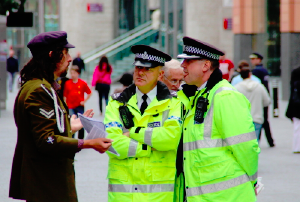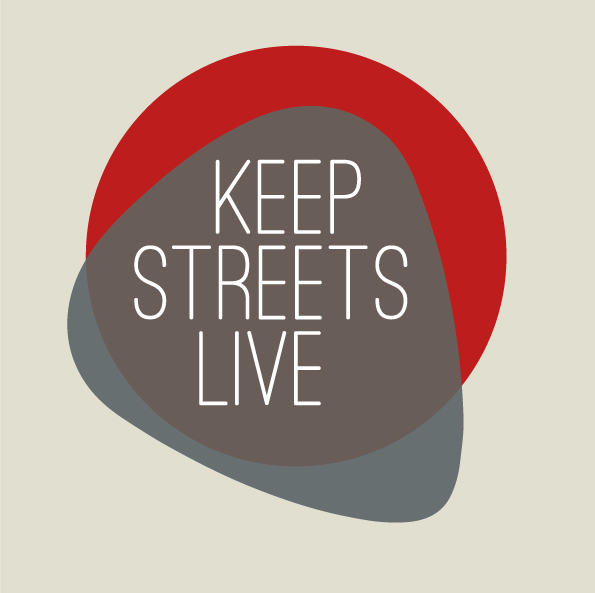The Spirit and The Law

The campaign to Keep Streets Live in Camden has been gathering pace and some high profile support since the petition was launched just over two weeks ago which now has nearly 2500 signatures. ASAP! has joined forces with comedian and political activist Mark Thomas whose involvement will help him in his quest to participate in 100 minor acts of civil disobedience which, if he fails to complete, will see him having to donate £1000 to the woefully inept but seriously funny UKIP.
Although we are continuing to see the funny side, the issues at stake in Camden are very serious indeed for everybody who values public space. Camden Council’s plans to impose a strict licensing regime on any person who wishes to play music on the streets is a mindless tax on joy, spontaneity and basic freedom. The threats to confiscate instruments and to sell them unless a fine of £1000 is paid are a frightening prospect for any musician struggling to make their way in one of the world’s most expensive cities, and that is exactly what they are meant to be. Camden Council are attempting to use the law to frighten and bully people into a dull conformity. A Labour-led council, who should really be concentrating on mitigating the effects of £83.3 million worth of local authority cuts in the next year alone upon some of the most vulnerable people in London, are somehow finding the time to clamp down on one of the informal aspects of city life that gives people enjoyment and a feeling of belonging in an often threatening urban environment. I’m staggered that the police and the council have enough resources to be spending thousands of pounds on a scheme to regulate busking. With that in mind, just over a week ago I made a Freedom of Information request to the Metropolitan Police to see what their thoughts on busking were….Yesterday, I heard back from them…
Here is the exchange (With my thoughts in brackets next to their answers)
Dear Metropolitan Police Service (MPS),
Camden Borough Council are conducting a consultation on plans to
introduce a license system for busking in Camden. This request
seeks information on the policing of busking in Camden.
In the last 12 months:
What is the police policy on buskers?
Do the police see busking as a serious issue for the Camden police
force?
How many buskers have been arrested for busking in Camden?
How many buskers have been moved on, and for what reason?
What is the advice given to officers working on the beat how they
should deal with buskers?
Yours faithfully,
Jonathan Walker
Dear Jonathan Walker
I have been forwarded your request for information regarding busking in
Camden Town (copy below).
I am the Inspector with responsibility for the following wards –
Haverstock, Gospel Oak, Camden with Primrose Hill, Kentish Town,
Cantelowes and Belsize. As such I am in receipt of enquiries/complaints
made by the communities of those wards. I moved to this role in June and
was informed of the community complaints relating to busking. I will
attempt to answer your enquiries in the order in which you have raised
them.
What is the police policy on buskers?
The complaints regarding busking have mainly gone to the Councils noise
enforcement team. They have forwarded them to us for our information. As I
am sure you are aware my Neighbourhood Policing Teams respond to community
concerns. Part of that response has been to support the council officers
noise enforcement teams patrols in Busking hotspots (JW -Are they were the fire-jugglers gravitate to?) This we have been
doing at peak times. There is no policy on it as such but our patrol
strategy is to support the noise enforcement officers engagement of the
buskers. (Don’t you love the word ‘engagement’ in this context?) As you know the council have made a proposal for the licensing of
buskers. The noise enforcement officers engage the buskers and explain the
proposal. If there is any ‘extreme busking’ – amplified music or large
crowds causing obstructions of the highway then they are asked to move on (Extreme busking sounds like an endurance sport! In this definition anybody who uses an amplifier and is capable of attracting a crowd is guilty of ‘extreme’ busking! In Camden there is so much noise from traffic and music in shops as well as road works, that a small battery powered amp is a vitally important part of a street musician’s performance.)
Police only step in if required.
Do the police see busking as a serious issue for the Camden police force?
Complaints from the community are taken seriously. Large numbers of
complaints naturally provokes responses. You will no doubt be aware of our
policing challenges set by MOPAC, specifically in relation to the
reduction of the MOPAC 7 crimes – Violence with injury, Robbery, Burglary,
Theft of Motor Vehicle, Theft from a Motor Vehicle, Theft from a Person
and Vandalism (criminal damage) by 20%. You will and may say that busking
does not feature in that and should not be a priority. (That is exactly right. Busking DOES NOT feature in any of the priorities for policing which rightly revolve around solving crime and keeping people safe, particularly from serious crimes against the person.) You may also be
aware that in the same challenge we have also been asked to boost public
confidence by 20%. MOPAC sight four drivers to boosting public
confidence. Three of which apply to this issue :
* Engagement with the community – Committed to and engaged with the
community; listening, understanding and dealing with their
concerns; and are reliable
* Fair Treatment – Fair and treated with respect; helpful, friendly
and approachable
* Alleviating Local ASB – Reductions in local disorder and ASB
(Playing music on the streets is not anti-social and does not constitute ‘disorder’…Camden Council say they have received 100 noise complaints about busking in the last 12 months. That’s just over 10 a month in a city like London, not too bad really. Certainly not a major police matter with everything else going on)
You will see that working in partnership with the council on busking in
response to community complaints is necessary. We are in support of the licensing of buskers in Camden. (There’s a surprise, the Met Police are in favour of the extension of legal powers that can be used against individuals which would give them the right to seize equipment and instruments and take away people’s livelihoods. It would have been more interesting and more appropriate if the police, who are, after all, public servants, had remained neutral on what is clearly a political issue relating to the use of public space).
How many buskers have been arrested for busking in Camden?
None
How many buskers have been moved on, and for what reason?
I do not have any information on numbers as they are not recorded. (Again a clear sign that this is not a major policing issue, so why are they getting so involved?) If they
are asked to move by the enforcement officer and then move on there is no
course for police action. I have just spoken to an officer from the Camden
Town Centre Team who carry out 90% of our busking patrols and I am told it
is very rare that they have had to ask buskers to move on This IS NOT the experience of many of our members who frequently cite police harrasment as one of the pitfalls of busking in Camden. However, in future they will be able to cite this document as proof that the police don’t normally move buskers on unless…wait for it….)
As above it is only extreme buskers that we would make that request of due to
amplification or causing an obstruction. (There it is again, EXTREME buskers, defined as anyone using an amplifier, regardless of volume, or quality of the sound, or skill, or artistry, musicality, beauty or joy etc etc etc)
Most report back that if amplified, the equipment is turned off and they are allowed to continue.
Others state that some just pack up and move locations on seeing the noise
enforcement/police approach. If they are asked to move on its due to
amplification and/or obstruction of a highway
What is the advice given to officers working on the beat how they should
deal with buskers?
I believe I have covered this in my opening paragraph. Our staff our out
in support of the noise enforcement team. (Your staff should be out on behalf of all the people they are paid to serve, including buskers who can make a big contribution to keeping public spaces safe just by being present and can change threatening atmospheres by playing music, as well as being an extra pair of eyes and ears on the streets)
I have information of an intention for a demonstration or mass busk event
in Camden on Monday. It would appear that you have set this up and
requested support via social media sites. I understand that you want to
drum up (excuse the pun) support against the licensing proposal. It would
be beneficial for you to work with us so we are aware of your intentions,
locations, routes for your procession so we can facilitate any lawful
public protest. Could we meet to discuss your planned event. I attach some
useful legislation to assist you in the planning of your event. (I’d be happy to talk to you. I must emphasise, it is not a protest, it is a peaceful public gathering of the newly formed Citizen’s Kazoo Orchestra. We will be doing nothing more subversive then blowing kazoos in unison and handing out leaflets. We come in peace to celebrate public space and the freedom to play music on the streets without having to seek permission from the bureaucratic engine of local government. We expect our elected officials and public servants to concentrate their valuable times and resources upon keeping us safe and serving the public).
Friends, the future of public space in our capital city is the issue here. Private interests, backed up by public policy, if unchecked have the power to change the way in which we live our lives and experience our shared public spaces. If the police and the council can clamp down on street culture in a place as vibrant and diverse and as full of life as Camden, they can do it anywhere.
The freedom of the streets needs to be protected and upheld in a spirit of love and peace, and you can rest assured that ASAP! will do everything it can to safeguard and protect those freedoms, and to seek to work alongside the police and local authority to explore constructive ways of dealing with the issues that arise…
Peace,
Jonny




